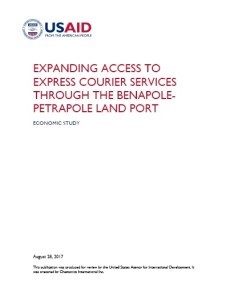Expanding Access to Express Courier Services Through the Benapole-Petrapole Land Port
 Currently, a Bangladeshi small or medium-sized enterprise (SME) cannot send small shipments via ground transportation to India using international express delivery services such as UPS, FedEx, or DHL. These shipments must travel via air, which inflates shipping costs and impedes Bangladeshi SMEs ability to serve India’s bourgeoning middle class and the opportunities presented by the rapid expansion of e-commerce (through such services as Amazon, eBay, Snapdeal, and Flipkart). In early 2017, the USAID Asia and Middle East Economic Growth Best Practices Project (AMEG) proposed a pilot project to demonstrate the viability and impact of expanding express shipments to the Benapole-Petrapole land port, one of the highest volume land ports in Asia.
Currently, a Bangladeshi small or medium-sized enterprise (SME) cannot send small shipments via ground transportation to India using international express delivery services such as UPS, FedEx, or DHL. These shipments must travel via air, which inflates shipping costs and impedes Bangladeshi SMEs ability to serve India’s bourgeoning middle class and the opportunities presented by the rapid expansion of e-commerce (through such services as Amazon, eBay, Snapdeal, and Flipkart). In early 2017, the USAID Asia and Middle East Economic Growth Best Practices Project (AMEG) proposed a pilot project to demonstrate the viability and impact of expanding express shipments to the Benapole-Petrapole land port, one of the highest volume land ports in Asia.
Proposed dual trial run: Through this demonstration pilot, an express courier truck would travel from the Kolkata, India airport across the Benapole-Petrapole border crossing to the Dhaka, Bangladesh airport and vice versa. This proposed Dual Trial Run would be conducted according to the draft protocols of the Bangladesh Bhutan India Nepal Motor Vehicles Agreement (BBIN MVA). The BBIN MVA was signed by all four governments in 2015; however, it is still pending ratification in Bhutan. Stakeholders interviewed by AMEG expect the agreement to be ratified and fully implemented eventually.
Based on economic theory and stakeholder discussions, the AMEG team believed that the proposed dual trial run, if fully implemented, would reduce express courier shipping costs thereby increasing market access for Indian and Bangladeshi businesses, reducing prices for consumers, and accelerating regional integration. Yet key stakeholders within the Government of Bangladesh expressed skepticism about the impact of such an initiative and AMEG lacked hard evidence — i.e., economic analysis — predicting the impact of such reforms and promote evidence-based policy making.
Research methods: AMEG engaged the South Asia Network on Economic http://healthsavy.com/product/cialis/ Modeling (SANEM) to conduct research to predict the economic impact of the governments of Bangladesh and India allowing express courier shipments via truck through the Benapole-Petrapole border crossing. SANEM Executive Director Dr. Selim Raihan and his team are the main authors of this report. To conduct the economic analysis presented, the SANEM study employed the computable general equilibrium (CGE) modeling framework of the Global Trade Analysis Project (GTAP), which is considered one of the best ways to analyze ex ante the economic consequences and trade implications of multilateral and bilateral trade agreements. In addition, the research team reviewed existing literature.
Key conclusions: SANEM’s economic model shows that express courier services via truck through land ports would result in significant positive economic gains for both Bangladesh and India. The gains are significant in terms of positive changes shown in indicators such as employment, export-import, and real GDP. The SANEM study predicts the following additional economic benefits to accrue to Bangladesh and India over a 5-year period as a result of such regularization:
Estimated Increase in Regional GDP: $6,055 million
Estimated Increase in Regional Employment: 1.69 million jobs
Estimated Increase in Net Bilateral Trade: $2,263 million
Estimated Increase in Regional Government Revenue: $195 million.
In addition to the impacts highlighted above, the increased flow of information, faster communication, and enhanced knowledge sharing will contribute to other components of trade and regional connectivity between the two countries. This will set standards for other countries under the BBIN-MVA and demonstrate the potential for additional reform. It is important, however, to note that this study is a first step. Successful implementation of this Express Courier Dual Trial Run will shed light on the limitations, best practices, and relevant constraints needed to scale-up this project in the future.
